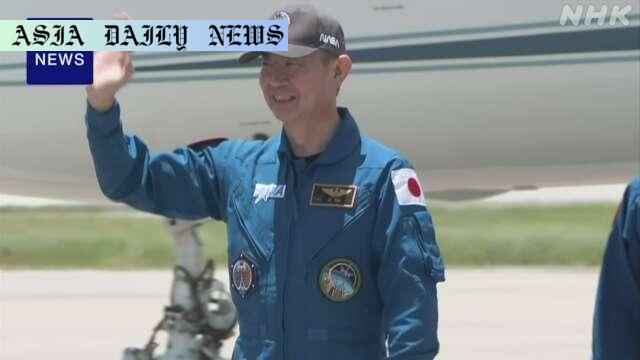Yui arrives at Kennedy Space Center to join a six-month ISS mission displaying remarkable international teamwork.
Japanese astronaut Yui Kimiya arrives at Kennedy Space Center for an ISS mission.
The Crew Dragon spacecraft is scheduled to launch on Thursday afternoon.
The mission highlights international collaboration between the US, Russia, and Japan.
Yui will take over duties from astronaut Onishi Takuya on the ISS.

Yui’s Arrival at Kennedy Space Center
Japanese astronaut Yui Kimiya, alongside his international crew members, has touched down in Florida at NASA’s Kennedy Space Center. This marks the final preparation phase for their impending voyage to the International Space Station (ISS). Scheduled to launch aboard the Crew Dragon spacecraft as early as Thursday at noon local time, the team will spend roughly six months conducting scientific research and maintaining vital operations on the orbiting laboratory. The collaborative nature of this team—representing Japan, the United States, and Russia—emphasizes the strength of international partnerships in advancing space exploration.
A Display of Unity in Diversity
During a press briefing, Yui shared his gratitude and sense of pride in being part of such a united team. He highlighted the respect and understanding each member brings to the group, celebrating their cultural and linguistic diversity as a tool for successful collaboration. This inclusivity is not only a practical necessity for space missions but also a symbolic representation of humanity’s collective aspirations. Yui’s remarks underscore the significance of maintaining harmony and mutual respect in high-pressure environments such as the ISS, a message that resonates strongly in today’s interconnected world.
Transitioning Roles and Preparedness
Yui is set to assume responsibilities from fellow Japanese astronaut Onishi Takuya, who has been stationed on the ISS since March. While Takuya has already contributed significantly to the ISS mission’s progress, Yui’s arrival will bring a fresh perspective and renewed energy to the team. Notably, Yui even joked about his readiness, symbolized humorously by his freshly cut hair—showing his approachable and optimistic personality. Beyond the individual contributions, these transitions ensure the continuity of scientific experiments, maintenance tasks, and interstellar diplomacy aboard the ISS.
The Legacy of Global Cooperation in Space Exploration
The upcoming mission represents yet another chapter in the long-standing history of international collaboration in space exploration. Countries like the United States, Japan, and Russia have continuously pushed boundaries, combining their technological capabilities and manpower to achieve extraordinary feats in space. Missions like these not only foster innovation but also serve as a testament to humankind’s ability to collaborate despite geopolitical differences. Yui’s involvement further strengthens the bridge between nations and inspires a sense of shared purpose, reminding us of what can be achieved when we work together.
Future Prospects and Scientific Milestones
As Yui and his team prepare to launch, the scientific community eagerly anticipates the potential breakthroughs their mission may bring. From studying the effects of microgravity on the human body to developing new materials and life-support systems, the upcoming six months aboard the ISS will provide invaluable data that could revolutionize industries back on Earth. Furthermore, these endeavors lay the groundwork for even more ambitious missions, such as crewed journeys to Mars or the establishment of lunar colonies. Yui’s participation is not only a point of pride for Japan but also a significant step forward for humanity as a whole.
Commentary
An Inspiring Milestone in Space Exploration
The arrival of Japanese astronaut Yui Kimiya at Kennedy Space Center is a heartfelt reminder of the remarkable strides humanity has made in space exploration. His participation in this international mission goes beyond national pride; it symbolizes the collective effort of humanity coming together to push the boundaries of what we know. The ISS remains a quintessential example of what can be achieved when people from diverse cultures, languages, and nations unite with a shared purpose.
Unity in Diversity: A Lesson for All
Yui’s reflections on respecting cultural and linguistic differences offer a profound lesson for us all. Whether in space or on Earth, collaboration thrives on understanding and mutual respect. The space station serves as a microcosm of an ideal world where differences are celebrated rather than dismissed. This mission, with contributions from Japan, the United States, and Russia, demonstrates the immense power of teamwork and communication, particularly in environments that demand precision and trust. It reminds us that while political conflicts may persist on Earth, partnerships in science and technology can bridge divides.
A Bright Future Ahead for Space Exploration
As humanity embarks on increasingly ambitious missions—whether it’s returning to the Moon or eventually sending astronauts to Mars—the lessons learned from current ISS missions are invaluable. Yui and his team’s work aboard the ISS over the next six months will undoubtedly contribute to a better understanding of space’s challenges and potential. Their collaborative spirit and dedication set a positive example for the future of exploration. With a shared commitment to pushing boundaries, there’s no telling how far humanity can go.


